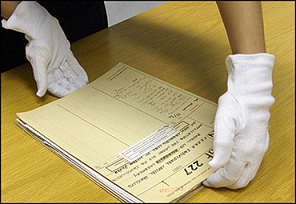
Archivists and curators have long required the use of white cotton gloves for handling very old paper or old books, when the paper is brittle and threatens to crumble. In fact, on one episodes of the popular television series Who Do You Think You Are? the guests and even some of the experts shown in the program were criticized for not wearing cotton gloves when handling old documents. However, experts now say that the use of white gloves not only provides a false sense of security but even can induce more damage than handling the same documents with bare hands! On the other, um, hand, simple frequent washing and drying of the hands may be the better solution.
In an article that first appeared in the December 2005 issue of International Preservation News, conservation consultant Cathleen A. Baker and librarian Randy Silverman argued that for the handling of most types of materials, white gloves don’t help and actually may contribute to the damage. As they pointed out, handling books with gloves is apt to do more harm than good. Gloves are just as likely to be dirty as fingers, especially if they have been used a number of times previously and have already absorbed dirt and chemicals from previously-handled papers. Once absorbed into the cotton, dirt, abrasive grit, and chemicals are easily spread from one old document to another. Washing the gloves frequently is only a partial solution since chemicals from detergents are retained in the cotton fibers and then spread to documents handled later.
A second issue is the loss of dexterity when wearing gloves. Without tactile "feel," wearing gloves actually increases the potential for physically damaging fragile material through mishandling. This is especially true for ultra thin or brittle papers that become far more difficult to handle with the sense of touch dulled.
Baker and Silverman wrote, "Routine hand washing is recommended as a more effective means of preventing the spread of dirt while improving the user's haptic response to and tactile appreciation of the collections."
They also stated, "Institutional insistence that patrons and special collections staff don white cotton gloves when handling rare books and documents to prevent dirt and skin oils from damaging paper-based collections is inherently flawed; gloves are as easily soiled as bare hands. Cotton gloves are extremely absorbent, both from within and without; for example, even a scrupulously clean reading room provides numerous opportunities for gloves to pick up and transfer dirt to surfaces such as a text page."
Finally, they wrote: "White cotton gloves provide no guarantee of protecting books and paper from perspiration and dirt, yet they increase the likelihood of people inflicting physical damage to collection material. Implementing a universally observed, hand-cleaning policy is a reasonable and effective alternative to glove-use, and it follows the standard protocol employed by book and paper conservators before handling the very same material."
The authors did point out that their recommendations are limited to paper. Other materials, such as photographic prints, negatives, and slides, have their own unique set of requirements.
You can read the entire report by Cathleen A. Baker and Randy Silverman at http://www.ifla.org/files/assets/pac/ipn/ipnn37.pdf
Other preservation organizations agree. Rather than wearing gloves, the American Institute for Conservation of Historical and Artistic Works instructs conservators to “handle books only with freshly washed hands.” Then they recognize that “wearing white cotton gloves for handling rare bindings is a good preventive measure, but turning fragile or brittle pages with gloves may cause damage and is not advised.” Thoroughly washing hands with lotion-free soap will remove most of the dirt, grease, and oils that may be left on pages.
Microfilm and digitization crews at The National Archives in London now follow the same rules for handling documents as those in the reading rooms – they have to remove their white gloves!
 Latest News Articles
Latest News Articles Do you have an RSS newsreader? You may prefer to use this newsletter's RSS feed at:
Do you have an RSS newsreader? You may prefer to use this newsletter's RSS feed at: